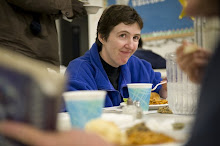Forgiveness
Remember the Christian Peacemaker Team workers who were kidnapped in Iraq in November 2005?
News comes from Sheila Provencher, a fellow CPT member and friend of theirs, that the men who kidnapped them have allegedly been apprehended and imprisoned in Iraq. Authorities have asked the three survivors to testify against their captors. James Loney, Norman Kember, and Harmeet Singh Sooden spoke at a press conference in London on December 8, and gave their response to that request.
Let these men be lights to the world, as winter approaches. If I ever were in a similar situation, I hope that I could respond with the same love, clarity, and living faith.
*****
We three, members of a Christian Peacemaker Teams (CPT) delegation to Iraq, were kidnapped on November 26, 2005 and held for 118 days before being freed by British and American forces on March 23, 2006. Our friend and colleague, Tom Fox, an American citizen and full-time member of the CPT team working in Baghdad at the time, was kidnapped with us and murdered on March 9, 2006. We are immensely sad that he is not sitting with us here today.
On behalf of our families and CPT, we thank you for attending this press conference today.
It was on this day a year ago that our captors threatened to execute us unless their demands were met. This ultimatum, unknown to us at the time, was a source of extreme distress for our families, friends and colleagues.
The deadline was extended by two days to December 10, which is International Human Rights Day. On this day, people all over the world will commemorate the adoption of the Universal Declaration of Human Rights by the UN General Assembly in 1948 by speaking out for all those whose human dignity is being violated by torture, arbitrary imprisonment, poverty, racism, oppression or war.
We understand a number of men alleged to be our captors have been apprehended, charged with kidnapping, and are facing trial in the Central Criminal Court of Iraq. We have been asked by the police in our respective countries to testify in the trial. After much reflection upon our traditions, both Sikh and Christian, we are issuing this statement today.
We unconditionally forgive our captors for abducting and holding us. We have no desire to punish them. Punishment can never restore what was taken from us.
What our captors did was wrong. They caused us, our families and our friends great suffering. Yet, we bear no malice towards them and have no wish for retribution. Should those who have been charged with holding us hostage be brought to trial and convicted, we ask that they be granted all possible leniency. We categorically lay aside any rights we may have over them.
In our view, the catastrophic levels of violence and the lack of effective protection of human rights in Iraq is inextricably linked to the US-led invasion and occupation. As for many others, the actions of our kidnappers were part of a cycle of violence they themselves experienced. While this in no way justifies what the men charged with our kidnapping are alleged to have done, we feel this must be considered in any potential judgment.
Forgiveness is an essential part of Sikh, Christian and Muslim teaching. Guru Nanak Dev Ji, the first of the Sikh Gurus said, "'Forgiveness' is my mother..." and, "Where there is forgiveness, there is God." Jesus said, "For if you forgive those who sin against you, your heavenly Father will also forgive you." And of Prophet Mohammed (peace be upon him) it is told that once, while preaching in the city of Ta'if, he was abused, stoned and driven out of the city. An angel appeared to him and offered to crush the city between the two surrounding mountains if he ordered him to do so, whereupon the Prophet(PBUH) said, "No. Maybe from them or their offspring will come good deeds."
Through the power of forgiveness, it is our hope that good deeds will come from the lives of our captors, and that we will all learn to reject the use of violence. We believe those who use violence against others are themselves harmed by the use of violence.
Kidnapping is a capital offence in Iraq and we understand that some of our captors could be sentenced to death. The death penalty is an irrevocable judgment. It erases all possibility that those who have harmed others, even seriously, can yet turn to good. We categorically oppose the death penalty.
By this commitment to forgiveness, we hope to plant a seed that one day will bear the fruits of healing and reconciliation for us, our captors, the peoples of Canada, New Zealand, the United Kingdom, the United States, and most of all, Iraq. We look forward to the day when the Universal Declaration of Human Rights is respected by all the world's people.
Harmeet Singh Sooden, Norman Kember, James Loney





No comments:
Post a Comment